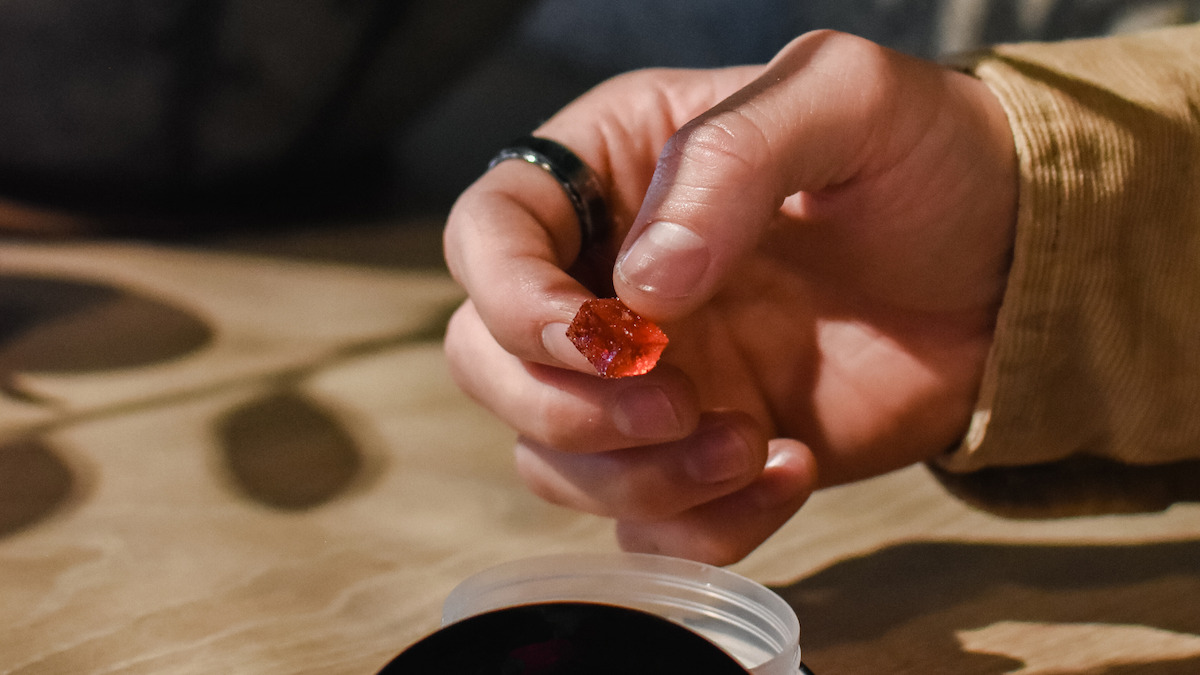There’s something lovely about New England winters – on the right days, you feel like you’re in a snow globe or a Hallmark movie and the holiday cheer is palpable. However, for as much magic as there may be, there’s also plenty of blues.
It gets cold and dark, and many people find themselves isolated from their friends and family due to the weather changes. Not to mention, shorter days and less sun negatively affect your physical and mental health.
That’s why supporting your mental health during the winter season is paramount to maintaining a sense of normalcy while things change throughout the year.
At Full Harvest Moonz, we’re not only local Massachusetts winter experts, but we’re also proponents of holistic health. Our staff and customers use cannabis year-round to support their mental health, so we’re rounding up some of our favorite ways to use cannabis to help your winter blues:
What are the winter blues?
The “winter blues,” often referred to as Seasonal Affective Disorder (SAD) or seasonal depression, is a mood disorder characterized by recurrent depressive symptoms that manifest in a seasonal pattern, typically during the fall and winter months.
Seasonal depression shares many symptoms with major depressive disorder, including:
- Low energy
- Feelings of sadness or hopelessness
- Oversleeping
- Weight gain
- Irritability
- Reduced interest in activities
It’s important to remember that clinically diagnosed SAD is much different from the winter blues that many experience during the winter.
One leading theory attributes seasonal depression to the disruption of your body’s internal clock, or circadian rhythm, due to decreased exposure to natural light during the darker winter months. This disruption can lead to imbalances in neurotransmitters such as serotonin and melatonin, impacting mood and sleep regulation.
Managing the winter blues can involve various strategies, including light therapy, psychotherapy, medication, lifestyle adjustments, complementary therapies and cannabis use.
When to seek professional help
It’s worth noting that individual experiences with seasonal depression can vary widely. Some may not experience SAD at all, while others may feel it in different ways.
While the “winter blues” may not require additional external support, some individuals may experience more intense symptoms and disruption to their regular lives. It’s important to call your doctor if you experience signs such as:
- Feeling depressed most of the day
- Little to no interest or pleasure in activities that you used to enjoy
- Significant changes in weight and appetite
- Feeling worthless, hopeless, or excessively guilty
- Difficulty concentrating more than usual
- Experiencing strong mood swings
- Thoughts of death, suicide, or harming others
If you suspect you or someone you know is severely struggling with SAD, seeking professional help is crucial for diagnosis and guidance on suitable treatments and coping mechanisms.
*For immediate support, call or text 988 or chat at 988lifeline.org.

The Potential Role of Cannabis in Mental Health
As winter’s challenges approach, exploring the potential role of cannabis in mental health becomes increasingly relevant. Cannabis, with its compounds like CBD and THC, offers potential benefits for mental well-being, including:
- Stress reduction
- Anxiety management
- Mood stabilization
- Improved sleep
- Appetite stimulation
- Increased creativity
However, it’s essential to proceed with caution. Consulting experienced budtenders at licensed dispensaries is crucial. We can provide professional guidance on strains and products tailored to your specific needs and preferences, ensuring a safer and more effective experience.
| Read more: Cannabis Strains for Every Mood
In addition to consuming the recommended dosage of a given product, you can also microdose products to help enhance your daily wellness routine. Microdosing is the practice of taking small amounts of cannabis and THC to experience the effects without distracting you from your day.
This approach can be especially beneficial to beginners or those who may only want mild support from cannabis in the winter.
Responsible use, coupled with professional advice, can make cannabis a valuable tool for enhancing mental health during the winter while navigating the seasonal changes with greater ease.
To help you support your mental health this upcoming season, here are 8 ways to support your mental health in the winter, with and without cannabis:

1. Create a social support system
Just because it’s cold out doesn’t mean you can’t connect with your loved ones! Creating a strong social support system can be a crucial lifeline for mental well-being.
Connecting with friends and loved ones not only combats the isolation that can exacerbate seasonal blues but also offers emotional warmth and shared experiences. Whether it’s a cozy get-together, virtual chat, or a simple phone call, these interactions foster a sense of belonging and reduce feelings of loneliness and depression.
Here are some ideas you can use this winter:
- Themed potluck dinner parties
- Board game nights
- Carpool to the dispensary
- Virtual watch party
- Biweekly FaceTime dates
- Phone call smoke sessions
2. Prioritize your diet and nutrition
Maintaining a balanced diet that includes foods rich in certain nutrients can support mental well-being during the winter months, helping combat the winter blues or Seasonal Affective Disorder (SAD). Here are 10 foods that can be beneficial:
Fatty Fish
Fish like salmon, mackerel, and trout are high in omega-3 fatty acids, which are known to have mood-boosting properties. Omega-3s may help reduce symptoms of depression and improve overall mental health.
Leafy Greens
Spinach, kale, and other leafy greens are packed with folate, which plays a role in the production of dopamine and serotonin, neurotransmitters that regulate mood. You can make a warm grain bowl or even throw your leafy greens into your favorite soup recipe!
Nuts and Seeds
Almonds, walnuts, flaxseeds, and chia seeds are good sources of magnesium, which can help alleviate symptoms of depression and anxiety. Additionally, they provide healthy fats and protein for sustained energy. Plus, they make a great healthy snack when you’re binge-watching your shows.
Whole Grains
Whole grains like brown rice, quinoa, and oats provide a steady supply of energy and can help stabilize blood sugar levels. They are also a source of tryptophan, a precursor to serotonin. Not only will this keep your energy regulated throughout the day, but it’ll also have you feeling full and avoid excess weight gain.
Protein-Rich Foods
Lean proteins like poultry, lean beef, and tofu provide amino acids that are essential for the production of neurotransmitters, which regulate mood and stress. Plus, they make for some delicious wintertime meals.
Citrus Fruits
Oranges, lemons, and other citrus fruits are rich in vitamin C, which can help reduce stress and boost the immune system, indirectly supporting mental well-being. Simply drop some frozen or fresh citruses into your water or incorporate an organic orange juice/lemonade into your diet.
Avocado
Avocado is an excellent source of healthy fats, particularly monounsaturated fats. These fats can help maintain healthy brain function and may contribute to better mood regulation. Besides, who could say no to an avocado toast?
Turmeric
The active compound in turmeric, curcumin, has anti-inflammatory and antioxidant properties that may benefit brain health and potentially alleviate symptoms of depression. Learn how to make turmeric lattes at home or start adding a few teaspoons of turmeric to your spice blends when you’re seasoning your food – just a little goes a long way.
Legumes
Beans, lentils, and chickpeas are high in protein, complex carbohydrates, and fiber. They provide a steady release of energy and help regulate blood sugar levels, preventing mood swings. Try a nice bowl of chili or South Asian Madras lentils!
Herbal Tea
Herbal teas like chamomile and green tea have calming properties that can help reduce stress and improve overall mental well-being. Nothing like a warm cup of tea to cozy up with as you’re watching TV, reading a book, or enjoying time with your family and friends.

Remember that while these foods can contribute to mental well-being, a balanced diet is just one component of maintaining good mental health. It’s essential to combine a healthy diet with other strategies, such as regular exercise, adequate sleep, and stress management.
3. Maintain your exercise routine
Engaging in regular exercise, especially during the winter, can significantly boost your mental well-being. Indoor or at-home workouts offer a convenient way to stay active, even when the weather is less inviting.
Activities like yoga, pilates, or bodyweight exercises require minimal equipment and provide a great opportunity to reduce stress and improve mood. Additionally, home-based fitness apps and online classes offer structured routines that can be tailored to your fitness level and goals.
If you’re up for braving the cold, in-person fitness classes are also a great way to make sure you don’t become isolated from others!
Not only does exercise release endorphins, which can lift your spirits, but it also helps combat the lethargy that often accompanies the winter season. Staying active, even indoors, can be a powerful tool in maintaining a positive mindset during the colder months.
4. Continue your regular sleep schedule
Maintaining a consistent sleep schedule, especially when daylight hours vary during the winter, is essential for your mental well-being. A regular sleep routine helps regulate your body’s internal clock, making it easier to adjust to the changing seasons.
To support a steady sleep pattern, it’s advisable to establish a bedtime and wake-up time and stick to it every day. Create a relaxing pre-sleep routine that signals to your body that it’s time to wind down, such as reading a book, taking a warm bath, or practicing relaxation techniques.
In addition to using alarms, smart lights, and other tools, you can also support your sleep schedule through products like melatonin or cannabis.
If you’re considering using cannabis for sleep, be sure to mention it to your budtender as you’re browsing the menu. At Full Harvest Moonz, our staff is highly trained so that they can understand your unique needs and preferences to recommend products for you.
For instance, some individuals find that strains with higher CBD content and lower THC levels are more conducive to sleep, as CBD can have calming effects. Others, however, may prefer indica strains to promote relaxation.
The effects of cannabis can vary widely between individuals, so it’s essential to start with small doses and monitor your body’s response.
Here are some cannabis product recommendations:
- Haverhill Products
- Lowell Products
5. Incorporate mindfulness and meditation into your daily routine
Incorporating mindfulness and meditation into your daily routine during the winter can be a powerful way to manage the stress and anxiety that comes from seasonal changes. Specific techniques like journaling, meditation, and deep breathing exercises can help you stay grounded and find inner peace.
For instance, journaling provides an outlet for your thoughts and emotions, helping you gain insight into your mental state. Meditation and deep breathing exercises can promote calmness and relieve tension. You can try guided sessions on YouTube or mindfulness apps, such as Headspace or Balance, or use simple tactics, such as the 4-7-8 technique.
Combining these practices with cannabis is also a great way to enhance the experience. For example, meditation and cannabis go hand in hand to help you ease into the practice without being in your head too much!
6. Try light therapy
Light therapy, or phototherapy, is a straightforward solution for beginners to combat the winter blues and seasonal depression. It typically involves using a specialized lightbox that emits bright, UV-filtered light, replicating natural sunlight.
By sitting in front of the lightbox for about 20-30 minutes each morning, the bright light stimulates the retina, influencing neurotransmitter production in the brain. This can elevate mood, increase alertness, and regulate sleep patterns, countering SAD symptoms like low energy and depression.
Of course, you can also always go for a walk when the light is out! Bottom line: consistency is the key to effectively using this technique in your routine.
7. Moderate your media intake
There’s no denying that there’s a lot of overwhelming news happening in the world. In the last few years, we’ve been barraged with information about a global pandemic, regional wars, natural disasters, and more.
Controlling and revising your media intake during the winter months can significantly benefit your mental health when exposure to distressing news can be particularly challenging. While staying informed is important, constantly consuming negative world news can contribute to heightened stress and anxiety, especially when combined with the already gloomy atmosphere of winter.
It’s crucial to strike a balance. Limiting your media exposure, setting designated times for news updates, and choosing reliable sources can help reduce the overwhelming barrage of information.
Focus on uplifting and educational content, hobbies, and activities that promote positivity and relaxation. You can also turn to sources, such as Good Good Good for positive world news so you can still stay up to date. This approach can foster a more peaceful and mentally healthy winter season (and beyond!).
8. Add cannabis or CBD to your wellness routine
From the wake and bake to a regular CBD drink to unwind, there are many cannabis products you can use to support your mental health in the winter.
With their potential calming and anxiety-reducing effects, both CBD and cannabis can provide an additional layer of support for managing seasonal stress and mental health challenges.
As always, be sure to select quality products from reputable brands. At Full Harvest Moonz, we take a holistic approach, so you can lean on our budtenders to provide recommendations that may work for your unique needs.
With so many product options, you can even find some joy in exploring different cannabis product types, such as flower, pre-rolls, edibles, oils, capsules, or topicals, depending on your preferences.
Here are some product recommendations to get you started:
- Haverhill Products
- Lowell Products
Start with a low dosage and gradually increase it, monitoring your response to find the right balance.
CBD and cannabis should be part of a holistic approach to well-being, combined with mindfulness practices, regular exercise, and balanced diet tips we mentioned above.
With responsible use and ongoing self-awareness, using cannabis for mental health during the winter can be a great way to keep your cool (pun intended).

Get your winter cannabis essentials at Full Harvest Moonz
As we navigate the challenges of yet another New England winter, it’s vital to address seasonal depression and prioritize your mental well-being.
From incorporating cannabis into your wellness routine to finding more opportunities to connect with your loved ones and community, it’s a great time of year to hunker down and experiment with new, creative ways to support your mental health.
We invite you to embrace a comprehensive approach to self-care this year. And if you’re looking for your winter cannabis essentials, we’re here to assist you at our Full Harvest Moonz dispensaries in Lowell and Haverhill, ensuring a safe and regulated experience in enhancing your mental health during the winter months.
Explore our online menus or visit us in-store. You can also take advantage of our limited-time weekly deals!

